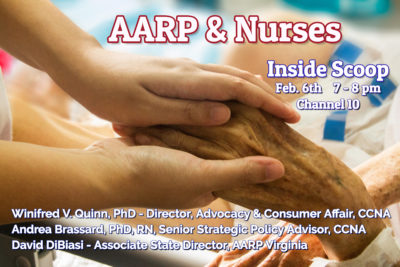Center to Champion Nursing in America – Inside Scoop
(Feb. 6, 2017) Catherine Read interviews Winifred V. Quinn, PhD, Director of Advocacy & Consumer Affairs for the Center to Champion Nursing in America. The CCNA is a collaborative effort of the AARP Foundation, AARP and the Robert Wood Johnson Foundation. Dr. Quinn talks about the hurdles facing Certified Nurse Practitioners (CNPs) in providing healthcare services in each of the 50 states. Requirements differ from state to state as far as physician oversight/collaboration with CNPs in the services they deliver to patients. States with rural populations have been the first to remove barriers to nurses providing services “to the full extent of their education and training.” More recently, the Veterans Administration has created a policy that allows nurses to provide services to the full extent of their education and training through VA facilities regardless of restrictions in place within individual states.
In the second segment, Catherine is joined by Andrea Brassard, PhD, RN, and Senior Strategic Policy Advisor to the Center to Champion Nursing in America. Dr. Brassard still engages in providing clinical nursing services on a limited basis in addition to assisting in CCNA’s policy creation. She brings a unique perspective to the benefits and challenges of allowing Certified Nurse Practitioners (CNPs) and Advanced Practice Registered Nurses (APRNs) to provide a full spectrum of healthcare services for which they have been trained. She points out that Nursing is consistently ranked as the No. 1 “Most Trusted Profession” in the United States and speaks to the varied skills nurses bring to their profession.
David DeBiasi, Associate State Director of AARP Virginia, joins Catherine in the third segment to talk about how the Affordable Care Act influenced modifications to the physician oversight requirement of Certified Nurse Practitioners here in Virginia. Instead of moving forward, Virginia’s policy moved “sideways.” The tweak to the policy has not allowed CNPs to practice to the “full extent of their education and training” and the resulting consultative/collaborative model has created a business model that doesn’t work for CNPs. While CNPs are required to collaborate with a physician in delivery of healthcare services through file reviews, physicians are not required to collaborate with CNPs. This has created instability in these relationships that undermines the creation of a viable business model.
Ultimately, the delivery of healthcare services in areas where there is a shortage of General Practitioner Physicians relies on removing barriers to nurses practicing to the “full extent of their education and training.” This realization that friction points are impacting the delivery of healthcare services have spurred states across the country to develop and pass less restrictive policies. Virginia currently does not have pending legislation in the 2017 Legislative Session. Going forward, it’s in the best interest of the public to understand these issues and why it’s important to advocate for nurses who will ultimately provide the bulk of the care for an aging American population.
Nursing is increasingly moving from clinical settings to community settings. Baby Boomers started 